Head of Ahmadiyya Muslim Community Holds Historic Class with Jamia Ahmadiyya Qadian
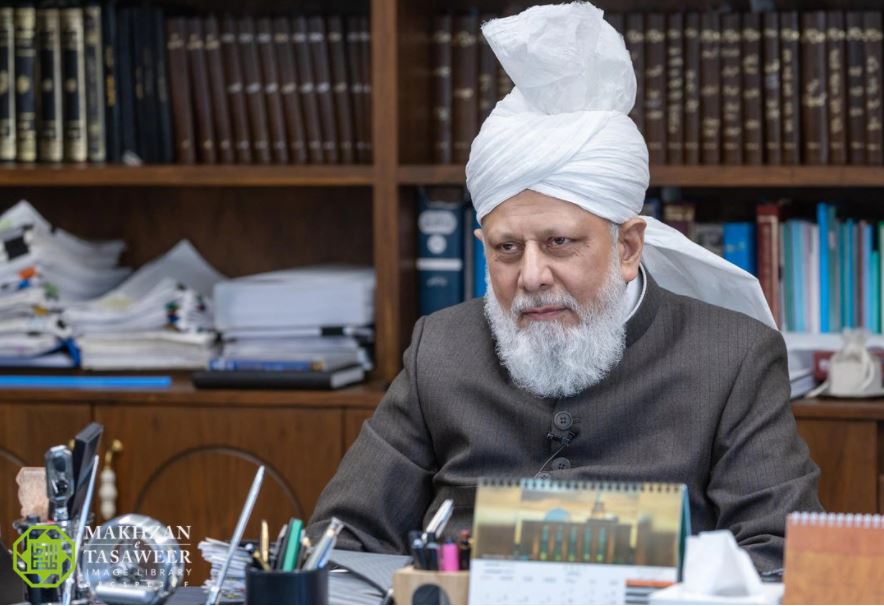
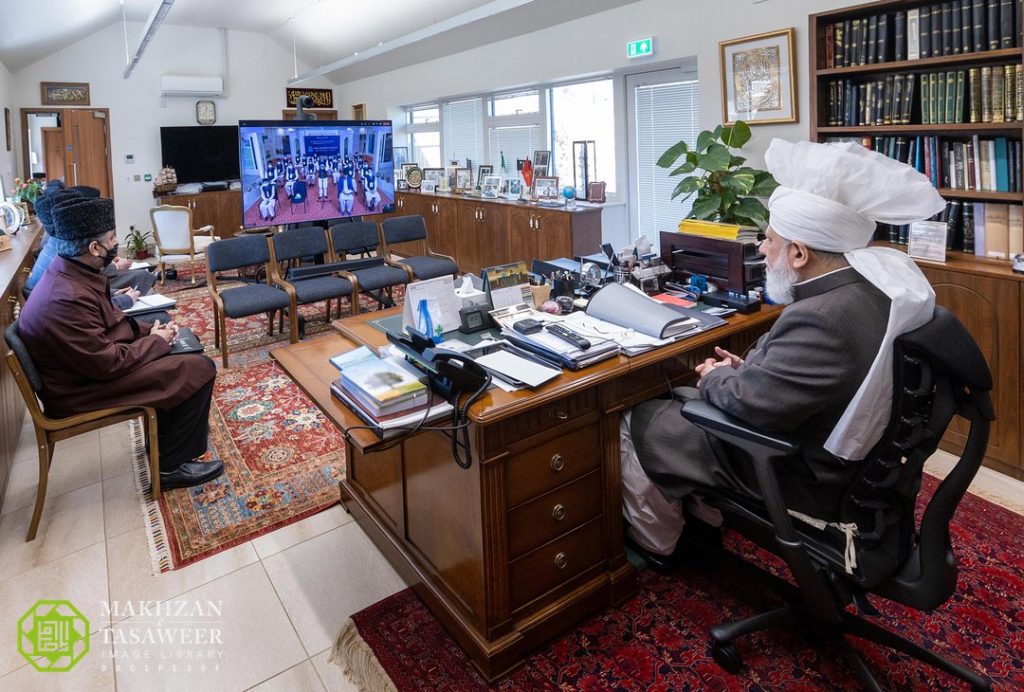
“…I bowed down before God, I opened my heart and wept before Him. I prayed to Allah the Almighty and He then created such means that helped me and removed all my worries.” – Hazrat Mirza Masroor Ahmad
On 17 April 2021, the World Head of the Ahmadiyya Muslim Community, the Fifth Khalifa (Caliph), His Holiness Hazrat Mirza Masroor Ahmad presided a sixty-five minute online class with 19 students of Jamia Ahmadiyya Qadian, India (Ahmadiyya Muslim Missionary training college in Qadian).[i]
It was the second time His Holiness presided a class with Jamia Ahmadiyya Qadian – the last time being on the occasion of His Holiness’ visit to Qadian in 2005. The trainee Missionaries from the historic and first Jamia Ahmadiyya, established in the blessed town of the Promised Messiah (peace be upon him), were able to collectively meet with and seek the guidance and prayers of their spiritual and religious leader once again.
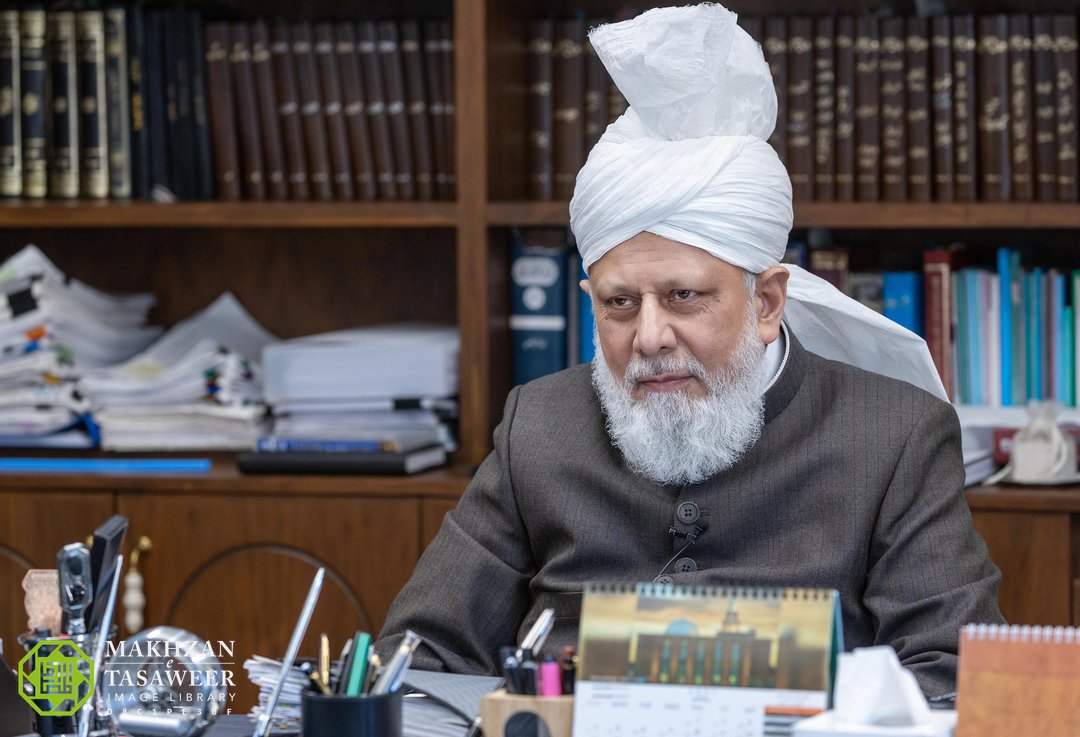
His Holiness presided the meeting from his office in Islamabad, Tilford, whilst the Jamia students joined the meeting virtually from the Holy Quran Exhibition Hall in Qadian, India.
The event began with the recitation of the Holy Quran, followed by a saying of the Holy Prophet Muhammad (peace and blessings be upon him). A poem was then recited, followed by an excerpt from the words of the Promised Messiah (peace be upon him). Thereafter the Principal of Jamia Ahmadiyya Qadian presented a report of the activities of Jamia Ahmadiyya and highlighted that 238 students currently studied in Jamia Ahmadiyya Qadian with 25 teachers serving in the institute.
His Holiness was also shown various images and videos of Jamia premises and other historic sites of Qadian in a video presentation.
Thereafter, students had the opportunity to ask questions on a range of issues affecting the young missionaries.
One student asked how they can do Tabligh [outreach] work effectively to Hindus. His Holiness replied, that much Tabligh work was already taking place in India and there had been some good results. Nonetheless, His Holiness said they should seek to expand the scope of their efforts.
Hazrat Mirza Masroor Ahmad said:
“It is the responsibility of a missionary that they analyse the particular conditions of their local areas and expand their Tabligh work accordingly, informing people of the true teachings of Islam. You should have good relations with people of different faiths, including Hindus, Sikhs, Christians and others…”
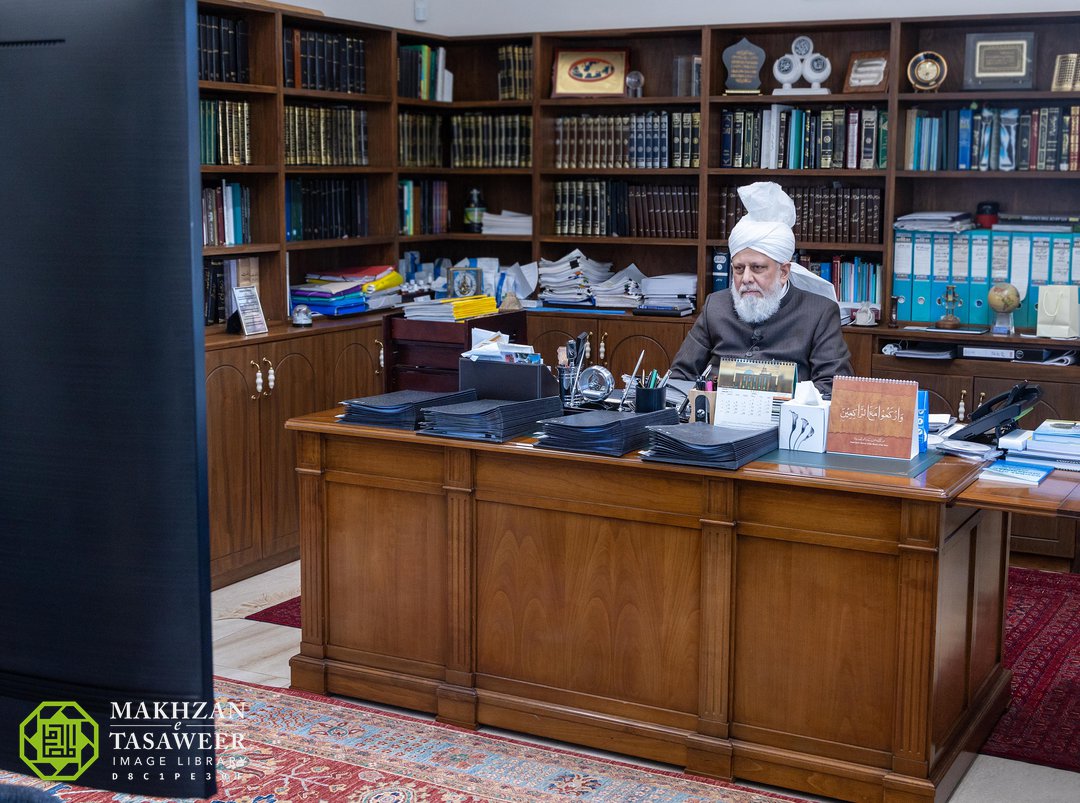
Hazrat Mirza Masroor Ahmad continued:
“When you enter into the field, after graduating as missionaries, constantly strive to expand your circle of contacts and inform people of the peaceful teachings of Islam… So it all depends upon you and how hard you are willing to work. My task is to guide and to provide directions and material (about Islam’s teachings) and I have done that extensively. It is your responsibility now to utilise it.”
After speaking of the lasting benefits and blessings of the previous visit of His Holiness to Qadian in 2005, one student asked when His Holiness will return to Qadian.
In response, expressing an ardent desire to visit Qadian, Hazrat Mirza Masroor Ahmad replied:
“My desire is to visit Qadian. I may even have visited last year or the year before but due to the prevailing conditions it was not possible. Also, I tried to visit Qadian in 2008 but returned (to the UK) after visiting South India as I was advised that it was better to do so due to the circumstances at the time. God Willing, whenever it is possible, I shall come to you and meet you. By that time, you may have entered into the field or you may still be a Jamia student. So it depends whether I have a Jamia class with you or I may meet you with the field missionaries. So let us see; whenever Allah the Almighty creates the opportunity, God willing I will come.”
One student asked how he can establish a personal relationship with His Holiness.
Giving a tip to the student and highlighting the true mark of closeness with the Caliph of the time, Hazrat Mirza Masroor Ahmad said:
“Place a photo of yours in the corner of your letter and that way I will know that you have written the letter and I will start to recognise you. There are many astute students of the different Jamias who already do this and so over time I begin to recognise them personally. Those living in the UK, I recognise them as they often meet me. However, simply having a personal relationship and recognition of someone in itself is not something to be proud of. The real connection and bond with Khilafat is established by acting upon the directives and the initiatives of the Caliph of the time and persuading others to do so and so you should pray to attain this true spiritual connection.”
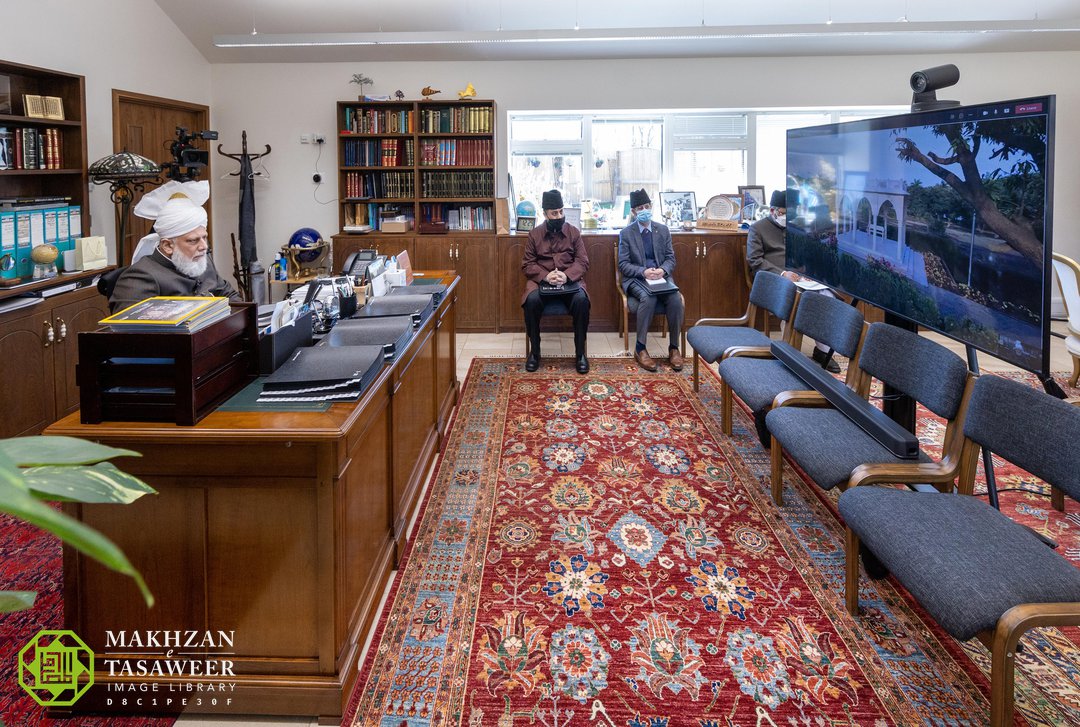
Hazrat Mirza Masroor Ahmad continued:
“The objective of a Missionary, whilst in Jamia and after graduation, is that with every day that passes he should understand ever more that it is his duty to become a true and devoted helper of the Caliph of the time. If you become so, fulfil your responsibilities and act with righteousness and if you pray ardently, then Allah the Almighty Himself creates those particular conditions through which you are able to attain the nearness of the Caliph of the time. So true closeness with the Caliph of the time is to become his true helper and to further his works and initiatives.”
Another student asked how they can preach to those living in village areas where people work in the fields and undertake other laborious work and so they may not have much time.
After directing on how Tabligh could be done in rural areas, His Holiness narrated a personal incident of preaching from the time when he was a student.
Hazrat Mirza Masroor Ahmad said:
“Where there is an earnest desire to do Tabligh work, new ways and avenues will emerge. I remember when I was studying in university, Majlis Khuddamul Ahmadiyya instructed that we should go out for Tabligh. So as young men we went by bike to the rural villages. There, we would offer to help the farmers with their work, such as watering the crop and then out of courtesy they would sit with us and speak for a while. In this way, we had the opportunity to introduce the Ahmadiyya Muslim Community to them…”
Hazrat Mirza Masroor Ahmad further explained:
“So even if you go into the villages, if you have the desire, then ways can always be found… It all depends on you – how efficient you are and how much passion you possess. If someone does not have a passion then he thinks, ‘why bother with work?’ But if they have a desire then they make use of even the smallest of opportunities.”
His Holiness was also asked if he ever faced any difficulty which had caused him extreme anguish.
Hazrat Mirza Masroor Ahmad said:
“By the Grace of Allah I have not faced any such overwhelming difficulty which would cause me to become extremely anxious or desperate. During my student life, as a student I was worried about passing my exams and so in such circumstances I bowed down before God, I opened my heart and wept before Him. I prayed to Allah the Almighty and He then created such means that helped me and removed all my worries. This has always been my experience and so if a person faces any type of difficulty he should beseech Allah. If he does sincerely and with purity of heart, then Allah the Almighty accepts their prayer. Certainly, prayers and charity (Sadqa) are the best means to eradicate one’s troubles – this is what we have been taught by Islam and this is what I have practiced whenever any hardship has arisen.”
Another question related to how a person can develop a true yearning and anguish in one’s prayers.
Hazrat Mirza Masroor Ahmad said:
“The Promised Messiah (peace be upon him) has made a generic point that if you are not attaining the pleasure in the prayers, you should pretend to be in great anguish and make a face as such. The physical state of a person affects the state of a person’s heart too… If you have faced a hardship then keep that hardship in your mind and pray. You will then attain the anguish and you will be more attentive towards praying.”
Hazrat Mirza Masroor Ahmad continued:
“If you have sympathy for others, then keep in mind the hardships they face and pray for them. That too allows a person to focus upon his prayers… A Missionary has dedicated his life for the service of Islam and his biggest challenge is that he must strive to make the entire world aware of the true teachings of Islam. This is a huge challenge and so if a Missionary focuses on this challenge and beseeches Allah the Almighty with the words that ‘I have dedicated my life to fulfil this objective and that I may become a true helper of the Caliph of the time and I have made a pledge, so how should I fulfil that pledge?’ it will create an anguish in your heart through which you will naturally be more attentive in your prayers.”
Another student asked why certain people whose worship seems to be regular, displayed bad morals.
Hazrat Mirza Masroor Ahmad replied:
“Allah the Almighty has said that along with worship you must fulfil the rights of His creation and you must better your morals. An action can only be a good deed when, along with your worship, you also have good morals… A person can only be considered a true worshiper if he worships Allah and fears Him. So when you worship Allah whilst fearing Him, it is impossible not to act upon the commandments that Allah the Almighty has instructed.”
Hazrat Mirza Masroor Ahmad went on and said:
“The Promised Messiah (peace be upon him) has explained that when we worship, our worship should also beneficially impact our morals and conduct. If we are not improving in this regard, then our worship is rendered meaningless. Allah the Almighty has said about certain people that ‘woe to those who pray.’ Why is that? It is because they are morally weak and they do not fulfil the rights of the creation of Allah the Almighty… This is why the Promised Messiah (peace be upon him) has said that he came with twin objectives – firstly to make people attached to God, to fulfil His rights and secondly, to make people fulfil the rights of all of God’s Creation.”
One of the Jamia students asked how they should begin their work when they are posted as a missionary to a particular place.
Hazrat Mirza Masroor Ahmad said:
“The foremost thing is to begin with prayer. When you are going into any field, give charity and pray that ‘Wherever Allah the Almighty is sending me into the field, may I truly fulfil the pledge I have made of dedicating my life and presenting myself as a missionary. May Allah enable me to fulfil that pledge in the best way.’ Remember, to fulfil that pledge which you have made is a commandment of the Holy Quran. For the Quran states that you must fulfil your trusts and a great trust has been placed in you. What is that trust? It is that you are to take the message of the Ahmadiyya Muslim Community, the true Islam to the people of the world and you must find the appropriate and innovative ways to do so. It should not be that you only wait until you receive instructions from the centre to distribute literature… Rather, you should find ways of conveying the message of Islam yourself.”
Hazrat Mirza Masroor Ahmad further stated:
“You must gauge what you need to do according to your local circumstances in order to better the moral and spiritual standards of Ahmadi Muslims in your area. You must analyse how you can make plans to morally elevate the standards of the members of the Ahmadiyya Muslim Community, be they elderly, young, men, women or children.”
Giving advice on how to resolve conflicts and the position of a missionary, Hazrat Mirza Masroor Ahmad said:
“When you observe that certain people have quarrels, then try to remove those conflicts and disputes. It is the responsibility of a missionary that he should not have any bias whatsoever towards either side. Justice demands that he should seek good relations with all parties and remain impartial. If you are going to resolve a conflict, until the issue is resolved, you must not eat or drink from the home of either party. Have food before leaving from your home and say to them that ‘I have come to make peace between you and I have come to inculcate brotherhood and love between you, according to the commandment of the Holy Quran. So I will not eat or drink from your house until you follow this commandment of Allah and His Prophet (peace and blessings of Allah be upon him).’”
Hazrat Mirza Masroor Ahmad further said:
“You should have a personal connection with every household where you are posted. You should visit them and they should visit you and be friends with everyone including the youth and the elderly. They should feel that the missionary who has come to them has sincere sympathy and love towards them and there should be so much trust that every person should be comfortable in confiding in you. Then you must bury in your heart whatever private and personal information the other person shares with you. It should not be that you hear one secret from one place and then you go to another place to expose it to others. Doing so would be to break the trust and confidences placed in you. So there are many aspects and when you establish these personal connections, you will realise that whatever you say will have a positive effect upon the people. Every member of the community there will listen to you and that community will develop love and brotherhood with one another.”
The meeting concluded with a poem recited by the students of Jamia Ahmadiyya Qadian whilst further views of various places of Qadian were shown on screen.
—
[i] The number of students of Jamia Ahmadiyya Qadian was restricted in line with local Covid-19 regulations.

